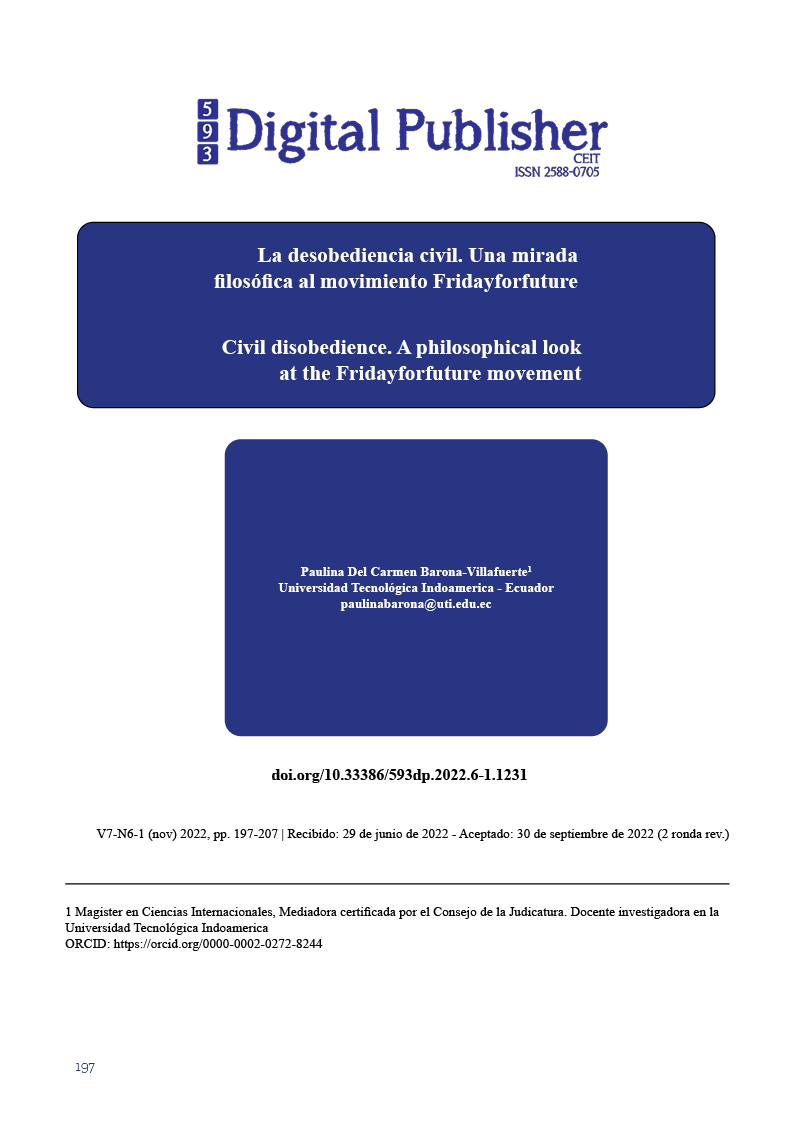Civil disobedience. A philosophical look at the Fridayforfuture movement
Main Article Content
Abstract
This paper entitled "Civil disobedience. A philosophical look at the Fridayforfuture movement", aims to analyze whether the Friday For Future movement led by Greta Thunberg constitutes a case of civil disobedience. Taking into account that Friday For Future is a movement that mainly fights for environmental protection and to generate change in the face of the disregard and passivity of world governments in the application of policies and laws that protect the environment, their environmental activism is manifested by protesting every Friday, calling international attention, and inspiring students, young people and others throughout the world to support their initiative and to participate in strikes and protests. Therefore, the characteristics of the Friday For Future movement meet the necessary conditions to be a clear example of civil disobedience, since it is a collective action, public, illegal, peaceful, against a specific unjust and immoral legal order and seeks to change world governments in the implementation of policies and laws that really protect the environment. In this context, the main points of discussion in this article are 1.- Civil disobedience; 2.- Brief historical review; 3. Greta Thunberg: a year to change the world, the documentary. The methodology used was qualitative, as a theoretical analysis of the subject of study was carried out and the bibliography related to the subject was consulted, with the purpose of reaching a better understanding of the subject and adequately interpreting the different concepts used.
Downloads
Article Details

This work is licensed under a Creative Commons Attribution-NonCommercial-ShareAlike 4.0 International License.
1. Derechos de autor
Las obras que se publican en 593 Digital Publisher CEIT están sujetas a los siguientes términos:
1.1. 593 Digital Publisher CEIT, conserva los derechos patrimoniales (copyright) de las obras publicadas, favorece y permite la reutilización de las mismas bajo la licencia Licencia Creative Commons 4.0 de Reconocimiento-NoComercial-CompartirIgual 4.0, por lo cual se pueden copiar, usar, difundir, transmitir y exponer públicamente, siempre que:
1.1.a. Se cite la autoría y fuente original de su publicación (revista, editorial, URL).
1.1.b. No se usen para fines comerciales u onerosos.
1.1.c. Se mencione la existencia y especificaciones de esta licencia de uso.
References
Alvarado Pérez, Emilio "Desobediencia Civil". En Román Reyes (Dir): Diccionario Crítico de Ciencias Sociales. Terminología Científico-Social, Tomo 1/2/3/4, Ed. Plaza y Valdés, Madrid-México 2009
Arendt, H., Crisis de la República, págs. 67-108, Madrid, Taurus, 1973.
Bedau, H.A. “On Civil Disobedience” Journal of Philosophy 58 (21), pp. 653- 665, 1961.
Bobbio, N., Gramsci y la Concepción de la Sociedad Civil, Barcelona, Avance, 1977.
Carvajal A. Patricio, "Derecho de resistencia, derecho a la revolución, desobediencia civil: una perspectiva histórica de interpretación. La formación del derecho público y de la ciencia política en la temprana Edad Moderna", págs. 63-101, Revista Estudios Políticos, n1 76, abril-junio 1992.
Cotarelo, R., Resistencia y desobediencia civil, Madrid, Eudema, 1987.
Cousins, N., "A Matter of Life", págs. 83 y 84, Rutgers Law Review, Vol. 21, otoño de 1966.
Dworkin, R., Los derechos en serio, págs. 324-327, Barcelona, Planeta- Agostini, 1993.
Esencia y valor de la democracia, Barcelona, Guadarrama, 1977.
Estévez Araujo, J. A., La Constitución como proceso y la desobediencia civil, Madrid, Trotta, 1994.
Habermas, J., Ensayos políticos, págs. 49-90, Barcelona, Península, 1988.
Jellinek, G., Teoría General del Estado, Buenos Aires, Albatros, 1970.
Kelsen, H., Teoría general del Estado, págs. 408-418, 461- 464 y 470-475, México, Editora Nacional.
Leibholz, G., "Representación e Identidad", en F. Neumann y K. Lenk (eds.), Teoría y Sociología Crítica de los Partidos Políticos, Barcelona, Anagrama, 1980.
Loewenstein, K., Teoría de la Constitución, Barcelona, Ariel, 1986.
Macpherson, C. B., La teoría política del individualismo posesivo: de Hobbes a Locke, Barcelona, Fontanella, 1970.
Malem Seña, J. F., Concepto y justificación de la desobediencia civil, Barcelona, Ariel, 1990.
Marcone, Julieta. Las razones de la desobediencia civil en las sociedades democráticas. Versión impresa ISSN 1870-0063 Andamios vol.5 no.10 México abr. 2009 Dossier: Ciudadanía y representación
Mateos Martínez, J. ¿Qué es la desobediencia civil? Una mirada jurídica www.elsaltodiario.com/conquista-derecho/que-es-la-desobediencia-civil
Rawls, J., Teoría de la justicia, México, FCE, 1979.
Schmitt, C., Legalidad y legitimidad, Madrid, Aguilar, 1971.
Thoreau, H. D., Walden and other writings, págs. 85-104, EEUU, Bantam Books, 1989.
Singer, P., Democracia y desobediencia, Barcelona, Ariel, 1986.
Tunick, M., "The Moral Obligation to Obey Law", presentado en el Encuentro Anual de la Asociación Americana de Ciencia Política, 31 de agosto-3 de septiembre de 1995.


